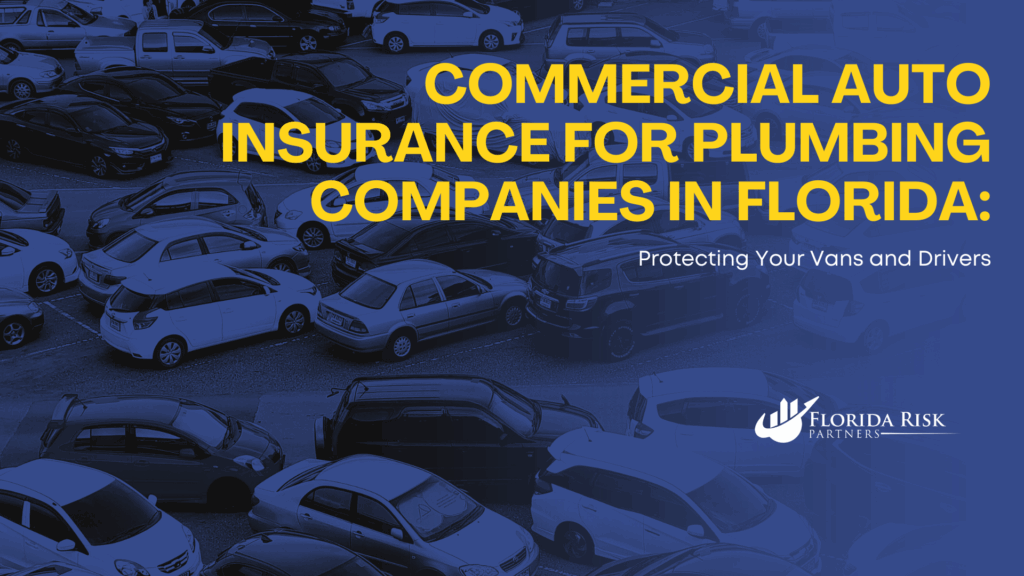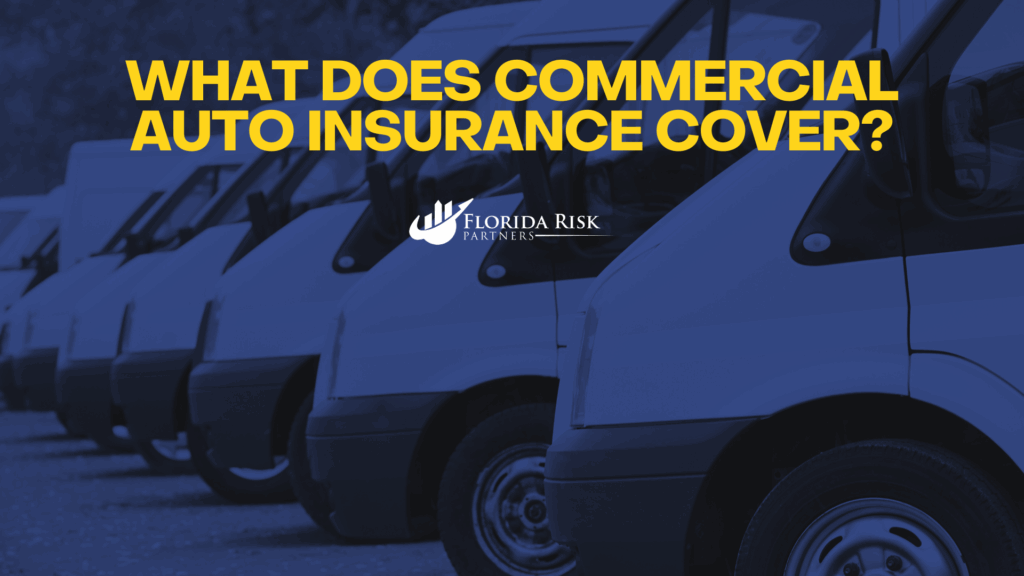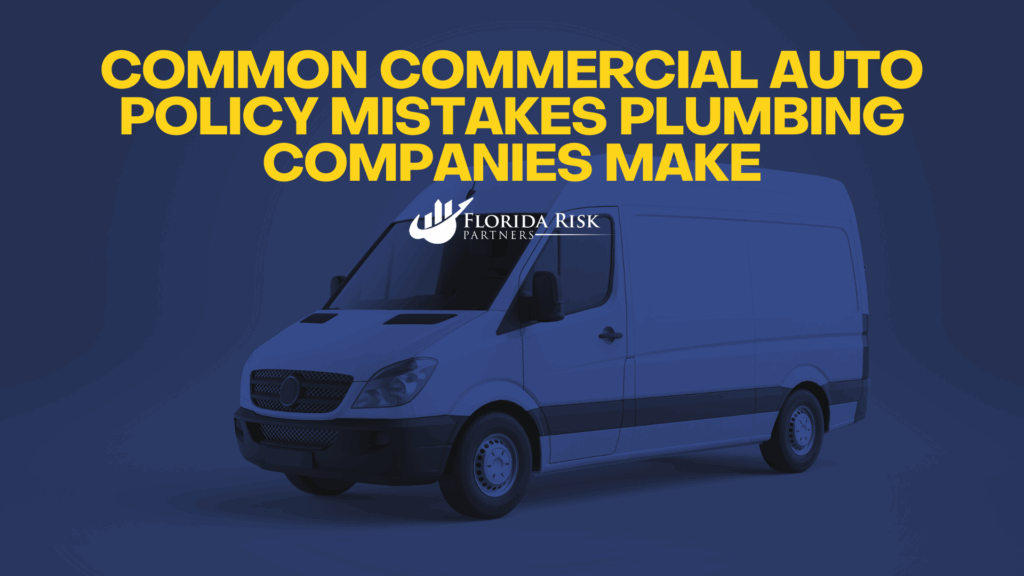-
Main Office: 1434 E. Bloomingdale Ave Valrico, FL 33596-6110
-
Phone: (888) 601-6660
-
Email: info@floridariskpartners.com

If you operate a plumbing business in Florida, chances are your vans, trucks, and service vehicles are the lifeblood of your operations. Every time your team gets behind the wheel to head to a job site, deliver materials, or haul equipment, they’re putting your business at risk—not just from accidents, but from theft, lawsuits, and uncovered claims. That’s why having the right commercial auto insurance for plumbing companies in Florida is non-negotiable.
In this post, we’ll explore how commercial auto insurance protects your plumbing business, what’s typically covered (and not covered), how Florida-specific laws come into play, and why working with a knowledgeable insurance advisor can keep your fleet and your financial future protected.
Why Plumbing Contractors in Florida Need Commercial Auto Insurance
Many plumbing business owners assume that a personal auto policy will provide coverage if a vehicle is involved in an accident while on the job. That’s a dangerous misconception.
Personal auto policies typically exclude business use—which means if one of your employees is involved in an accident while driving a company truck to a job site, your claim could be denied.
Commercial auto insurance is designed to fill that gap. It protects your vehicles, your drivers, your tools, and your business from the financial fallout of accidents, lawsuits, and other road-related risks.
In Florida—where highways are crowded, accidents are frequent, and litigation is common—commercial auto coverage is not just advisable. It’s essential.
What Does Commercial Auto Insurance Cover?
A well-structured commercial auto insurance policy provides a range of protections tailored to the specific risks faced by plumbing contractors.
Liability Coverage
If your driver is found at fault in an accident, liability coverage pays for:
- Bodily injury to the other party
- Property damage (e.g., damage to another vehicle or structure)
- Legal defense costs if you’re sued
Florida law requires a minimum of $10,000 in Personal Injury Protection (PIP) and $10,000 in Property Damage Liability (PDL)—but those limits are insufficient for most commercial operations. Most plumbing contractors carry $500,000 to $1 million in liability limits, if not more.
Collision Coverage
Covers repair or replacement costs for your work vehicle if it’s damaged in a collision—regardless of who is at fault.
Comprehensive Coverage
Protects against non-collision events like:
- Theft or vandalism (a big concern for plumbers with tools stored in vans)
- Storm or hurricane damage (especially important in Florida)
- Fire, falling objects, or animal strikes

Uninsured/Underinsured Motorist (UM/UIM) Coverage
Florida has a high rate of uninsured drivers. This coverage helps pay for injuries and damages if your driver is hit by someone who lacks sufficient insurance.
Hired and Non-Owned Auto Coverage (HNOA)
Covers liability for vehicles your employees use for work but don’t own—like renting a truck for a project or an employee driving their personal car for a supply run.
Medical Payments Coverage
Pays for medical expenses for your driver and passengers regardless of fault.
Real-World Risks for Florida Plumbing Contractors on the Road
Your plumbing fleet isn’t just a mode of transportation—it’s a mobile job site, workshop, and tool locker. And with that comes exposure to serious risks:
Theft of Tools and Equipment
Vans and trucks often carry thousands of dollars in plumbing tools, cameras, meters, and parts. If a thief breaks into a vehicle—especially at night or while parked at a job site—standard auto insurance does not cover stolen tools. You need inland marine coverage for that (we’ll cover this in Week 5), but your commercial auto policy can help with any resulting vehicle damage from the break-in.
Traffic Accidents and Liability Lawsuits
Whether it’s a fender bender in downtown Tampa or a multi-vehicle crash on I-95, Florida’s roads are notoriously congested and accident-prone. If your driver is at fault, the injured party’s attorney will likely come after your business.
Weather-Related Damage
In Florida, your vehicles are constantly exposed to the elements—heat, humidity, tropical storms, and hurricanes. A comprehensive commercial auto policy helps you recover quickly if weather damage sidelines part of your fleet.
Why Florida’s No-Fault Laws Matter
Florida is a no-fault state, which means that drivers must carry Personal Injury Protection (PIP) to pay for their own injuries after an accident, regardless of fault. But here’s the catch:
- PIP only covers up to $10,000 in medical expenses and lost wages
- It does not cover vehicle damage
- It does not protect your business from being sued
As a business owner, relying solely on the state minimums is a massive risk. If your driver causes serious injuries, you could be facing hundreds of thousands of dollars in damages.
That’s why increased liability limits, uninsured motorist coverage, and umbrella liability insurance are strongly recommended for plumbing companies operating in Florida.
Common Commercial Auto Policy Mistakes Plumbing Companies Make
Having a commercial auto policy isn’t enough—you need the right policy. Here are a few common mistakes that can leave Florida plumbers dangerously underinsured:

Insuring Vehicles Under Personal Auto Policies
If a company-owned van is insured on a personal auto policy and is involved in an accident while conducting business, your claim can be denied. Always insure business-use vehicles on a commercial policy.
Not Scheduling All Vehicles or Drivers
Leaving vehicles or drivers off your policy—especially part-timers or seasonal workers—can cause headaches if an accident occurs. Florida insurers may deny claims if the driver wasn’t reported or scheduled.
Skipping Hired/Non-Owned Auto Coverage
If an employee uses their personal car for business and gets into an accident, your company could be liable—even though it’s not a company-owned vehicle. HNOA is affordable and provides critical coverage in these scenarios.
Underinsuring Liability Limits
Minimum limits may satisfy the law, but they won’t protect your business from a major lawsuit. Always evaluate your potential liability exposure and consider higher limits or an umbrella policy.
Managing and Protecting Your Fleet
A solid commercial auto insurance policy is only one part of your vehicle risk management strategy. Here are a few additional steps plumbing companies in Florida can take:
Keep Vehicle Maintenance Records
Poorly maintained vehicles are more prone to accidents. Keeping records also helps in the event of a claim or DOT audit.
Conduct Driver MVR Checks
Review the Motor Vehicle Records (MVRs) of all drivers before hiring and annually thereafter. Poor driving histories can increase your premiums and risk profile.
Implement Telematics or GPS Monitoring
Many insurers now offer premium credits if you use GPS, telematics, or dash cams to monitor driving behavior and improve safety.
Establish a Vehicle Use Policy
Clearly outline who can drive company vehicles, under what conditions, and how vehicles must be secured—especially overnight or at job sites.
What Does Commercial Auto Insurance Cost for Florida Plumbing Businesses?
Premiums for commercial auto insurance in Florida vary widely depending on:
- Number of vehicles
- Types of vehicles (cargo van vs. heavy-duty truck)
- Radius of operations (local or long-distance travel)
- Driver histories
- Claims experience
- Coverage limits and deductibles
On average, Florida plumbing companies can expect to pay between $1,200 and $2,500 per vehicle per year, though this may increase based on fleet size and exposure.
Partnering with the Right Insurance Advisor
The best way to ensure your commercial auto insurance policy actually protects your plumbing business? Work with an agent who specializes in contractor insurance in Florida.
An experienced insurance partner will:
- Help you choose the right liability limits and optional coverages
- Identify coverage gaps (like tools in transit)
- Manage COI issuance for job sites and contracts
- Navigate Florida-specific auto insurance regulations
- Help reduce premiums through safety programs and fleet management best practices
Final Thoughts: Don’t Let an Accident Derail Your Business
When you operate a plumbing company in Florida, your vehicles are more than transportation—they’re a reflection of your business. Whether you’re moving people, parts, or high-end tools, protecting your fleet is critical to maintaining profitability, professionalism, and peace of mind.
Don’t leave your vehicles—or your business—unprotected. A properly structured commercial auto policy is your first line of defense on the road.
Let’s Review Your Fleet Coverage
Want to make sure your commercial auto policy is truly protecting your plumbing business? Click here to schedule a free consultation and let’s make sure your vehicles, tools, and team are covered from bumper to bumper.
Call Us Or
Schedule an Appointment
Select an agent below to view our online calendars and select a day and time that works best for you or call us directly at 888-601-6660. When you use our online calendars, you will receive an email with more information.



